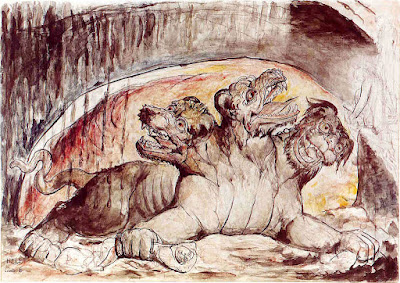Monday, January 16, 2017
Mythic Underworld: Cerberus and Mysteries
The story of the twelve labors of Heracles is simple. Driven mad by the goddess Hera, he killed his own children. Since this was such an awful deed, he was given ten labors by Eurystheus to expiate himself; technicalities allowed Eurystheus to add two additional labors. The twelfth, capturing the hound Cerberus, is the one we're interested in.
Cerberus (the "C" is hard) is the guard-dog of Hades, who prevents unwanted access to the underworld. He is usually depicted with three heads, although in connection with the Hecatoncheires (100-handed giants), may have had 50 or 100 heads, some of which may have been snake heads. And he had snake tails, or several backs. In any case, you've got a nasty beast that stops the dead from escaping the realm of Hades.
As Heracles prepared to enter the underworld and retrieve Cerberus, he was initiated into the Eleusinian mysteries. This was a rite of knowledge, granting Heracles insight into the secrets of Persephone and Hades, and is certainly notable because it is the earliest reference to Greek mystery religions. So armed with new understanding, Heracles descended into the realm of Hades.
It's not exactly clear how Heracles got Cerberus out. Some accounts have him wrestling the beast and beating it, possibly involving the impenetrable skin of the Nemean Lion that Heracles used as a cloak. Others say that Persephone, who thought kindly of Heracles, gave the hero a chain, or possibly that she herself chained the beast and handed it over. The fight makes the more obvious of the two stories, but it's intriguing to think about the hero winning the fight by getting Persephone on his side.
Of course, Eurystheus did not actually want Cerebus, and Heracles returned the beast to its proper place in Hades after having brought it up to the surface. This last bit is probably the most amusing part of the tale; unlike the Lernaean Hydra or the Nemean Lion, Cerebus is not a menace to be slain. Hell is supposed to have a three-headed dog-beast who eats anyone trying to leave.
If all we got for gaming from the tale was Cerberus as guard-dog, that'd still be an interesting twist on the dungeon guardian. After all, Cerberus was not there to keep intruders out, but to pen the denizens of the underworld in. I really like the idea of a formidable monster that is not necessarily an immediate threat for PCs to overcome, but plays a role in the dungeon's ecology nonetheless. Some groups will try to kill simply anything, but that can always be solved by a powerful creature that refuses to offer direct combat. Of course, at some point the PCs will have to deal with the creature – but by that time it will become a strategic obstacle to overcome.
Then there's the little matter of the Eleusinian mysteries. This is a secret initiation ritual that gives hidden knowledge; in many cases this hiddenness was quite literal, and the content of the mysteries have been lost to the ages. Such an initiation is a way to integrate player characters more deeply into the setting. We are used to scriptural religion in the West, but introducing a mystery is an opportunity to create literally esoteric knowledge about the world, which can be revealed to players only when their PCs make a particular commitment. PCs, of course, will be inclined toward the mysteries that grant knowledge of the dungeon underworld they face.
The last idea that I particularly like is the loan of a chain from Persephone. This is a good way to have a taste of powerful artifacts in the campaign, by lending them instead of permanently giving them to the PCs. Most artifacts throw off the ability of PCs to be meaningfully challenged, but having them given on short-term loan lets them flavor the game without dominating it.
However many heads Cerebus has, the story of Heracles subduing him has a lot of interesting wrinkles for the D&D underworld. I do want to tackle more Mythic Underworld segments, because Greek myth alone has a lot to offer in this regard.
Subscribe to:
Post Comments (Atom)


You should also check out the rules of the Sumerian underworld as described in the epic of Gilgamesh.
ReplyDeleteCool stuff, but don't mix up Cerberus with Cerebus the Aardvark!
ReplyDeleteHad I gone with my first instinct and written "Kerberos" I would never have flipped the two. ;-)
Delete